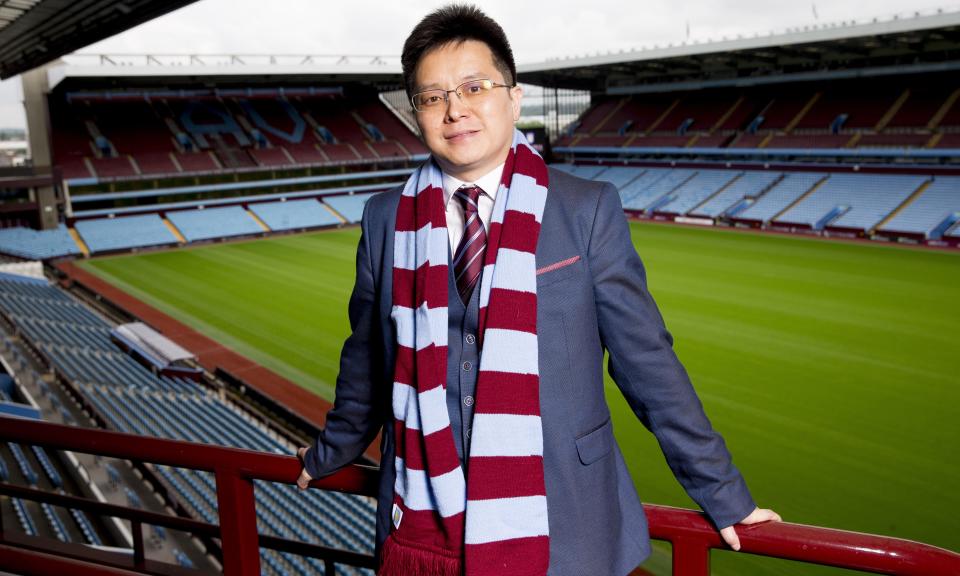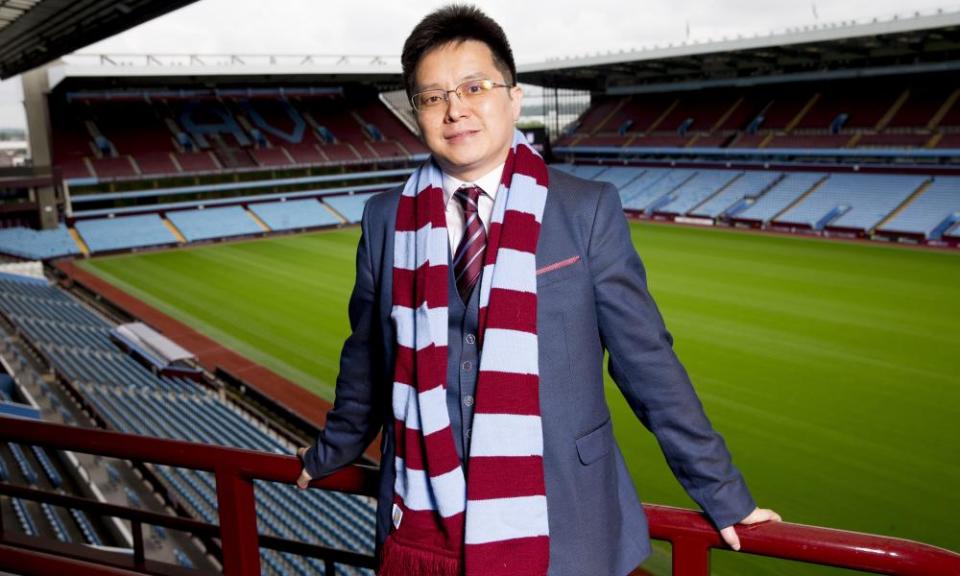Aston Villa face bleak future as Tony Xia shortfall exposes house of cards
Alarm bells were ringing at Aston Villa long before a tax bill went unpaid last month. The first indication that all was not well came last year, when Tony Xia’s monthly payments stopped arriving with the same frequency, leaving a club that were operating way beyond their means, and are totally dependent on the owner’s financial support, scrambling around to pay the bills.
Xia, the Chinese businessman who revealed that it was his dream to turn Villa into one of the world’s top three clubs when he took over two years ago, had previously always made regular transfers to cover the outgoings, averaging around £4m a month across his first season. Yet the Guardian understands that those payments were made nothing like as consistently from as far back as 2017.
Villa, one way or another, managed to get by for the majority of last season, sometimes by asking clubs to bring forward staggered transfer fees for players that had been sold on. That practice, not uncommon in the Championship, saw Villa write off money in the long term to solve cash-flow problems in the short term.
PLAY: World Cup famous goal scorers quiz
PLAY: World Cup classic kits
PLAY: England’s World Cup record since 1966
VOTE: Who is your all-time World Cup legend?
Reality, however, was about to bite. In April and May, as the season neared the end, the money trail from China dried up completely and Villa’s financial position became critical. HM Revenue & Customs was due a payment in the region of £4m after May’s payroll and Villa, quite simply, had no way of getting their hands on the money.
The Championship play-off final was on the horizon – a get-rich-quick ticket that had the potential to put Villa’s financial worries to bed – but so was the HMRC deadline, which came 24 hours before the pivotal game against Fulham at Wembley. Villa missed the deadline and the golden ticket slipped through their fingers the following day. Suddenly it was crisis time.
Plenty of staff working within Villa Park must have seen the storm coming, including Keith Wyness, the chief executive, who felt duty-bound to act once it became clear that the club were not going to be able to pay HMRC. Wyness, who would have known the fiduciary responsibilities that come with his role on the board, is believed to have sought insolvency advice before and after the Fulham match.
Indeed, it is understood that Wyness advised Xia, who has been in Beijing since the play-off final, of the severe consequences of failing to pay HMRC, including the prospect of Villa being placed in administration and served with a winding up petition.
Xia was effectively placing all his chips on winning promotion with a high-risk strategy that has badly backfired
HMRC, which has adopted a robust approach in recent times to the football industry, was far from impressed with Villa’s inability to pay their tax bill and not minded to cut them much slack. The club were given a 10-day extension, which expired last Tuesday.
Wyness was no longer in control of the day-to-day running of the club by the time that deadline passed, after being told via a letter that he had been suspended. The reasons for that decision have not been made public but it is believed that Xia took exception to Wyness’s views on Villa’s predicament and wants the club to investigate the chief executive’s conduct in relation to the conversations that took place about insolvency.
It is all rather strange and, worryingly for Villa fans, easy to imagine things getting worse before they get better. Even if Villa come up with the money to cover May’s HMRC bill – there are suggestions an agreement will be reached by the end of the week – another payment will be due in less than three weeks’ time and then the whole episode starts again, not overlooking the fact that there will be many other creditors to satisfy. An exodus of players, including the departure of Jack Grealish, the club’s prize asset, seems inevitable.
Although complying with the Championship’s financial fair play rules threatens to be a major issue now that Villa’s three-year-loss limit has fallen to £39m, FFP is a problem for another day. The more pressing concern is the here and now, highlighted by a sobering story in the Birmingham Mail, revealing that the club are considering selling a plot of land close to Villa Park, which is used as a staff car park, to raise a few million quid.
This is the same club that embarked on an unprecedented spending spree at Championship level the season before last, when £88m was splurged on signings. Xia was effectively placing all his claret and blue chips on winning promotion with a high-risk strategy that has badly backfired and leaves the club with a huge financial void to fill next season, with or without his funding.
How much Xia is actually worth is a matter of debate and tied in with the question of why he is no longer bankrolling Villa. A key reason put forward is that the Chinese government has clamped down on capital flight, where investors send their money out of the country, although some Villa fans could be forgiven for wondering if that is a smokescreen for other issues. The club have been approached for comment.
Reports about potential takeovers continue to give those fans a glimmer of hope that there could be a resolution, although no change of ownership is anticipated in the near future. In fact, all that can be said for sure right now is that one of England’s most famous football clubs is in an awful mess.



